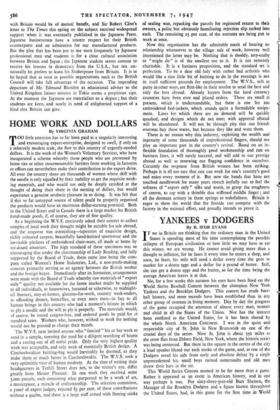HOME WORK AND DOLLARS
By VIRGINIA GRAHAM
T00 little attention has so far been paid to a singularly interesting and encouraging export-enterprise, designed to swell, if only on a relatively modest scale, the flow to this country of urgently-needed dollars. It is the work of the Women's Voluntary Services, who have inaugurated a scheme whereby those people who are prevented by home ties or other insurmountable barriers from working in factories or offices can nevertheless make their contribution to the export drive. All over the country there are thousands of women whose skill with the needle is only equalled by their inability to get the requisite work- ing materials, and who would not only be deeply satisfied at the- thought of doing their share in the earning of dollars, but would experience a genuine aesthetic pleasure in so doing. It was felt that if this so far untapped source of talent could be properly organised the products would have an enormous dollar-earning potential. Both in the United States and in Canada there is a large market for British hand-made goods, if, of course, they are of fine quality.
As a beginning the W.V.S. cautiously asked their centres to collect samples of local work they thought might be suitable for sale abroad, and the response was astonishing—tapestries of exquisite design, richly coloured carpets, beautifully hand-knitted sportswear and the inevitable plethora of embroidered chair-seats, all made at home by soi-disant amateurs. The high standard of these specimens was so encouraging that under the chairmanship of Lady Reading, and fully supported by the Board of Trade, there came into being the com- pany called Women's Home Industries, Ltd., a non-profit-making concern primarily serving as an agency between the British worker and the foreign buyer. Immediately after its formation, arrangements were made with the Board of Trade whereby raw materials of " export only" quality not available for the home market might be supplied to all individuals, to housewives, harassed or otherwise, to midnight- oil burners, stay-at-homes, gluttons-for-work, country week-enders, to offending drones, butterflies, or even mere men—in fact to all human beings in this country who had a moment's leisure in which to ply .a needle and the will to ply it properly. The materials would, of course, be issued coupon-free, and ordered goods be paid for at standard rates. Workers who, however, wished to work for nothing would not be pressed to change their minds.
The W.V.S. next invited anyone who " fancied " his or her work to send in a sample, stressing the need for a diligent searching of hearts and a casting- out of all sinful pride. Only the very highest quality work was acceptable, and only work of essentially British design. A Czechoslovakian knitting-bag would inevitably be doomed, as they make them so much better in Czechoslovakia. The W.V.S. took a very optimistic view of human modesty. At the time of writing their headquarters in Tothill Street does not, to the visitor's eye, differ greatly from Mount Pleasant. In one week they received some 5,000 parcels, each containing what purported to be a work of art, a masterpiece, a miracle of craftsmanship. The selection committee, a panel of expert judges, rejected 85 per cent. of these contributions without a qualm, and there is a large staff armed with flaming sticks of sealing wax, repacking the parcels for registered return to their owners, a polite but obviously humiliating rejection slip tucked into each. The remaining is per cent. of the entrants are being put to work at once.
Now this organisation has the admirable merit of bearing no relationship whatsoever to the village sale of work, however well intentioned the latter may be. Nothing that is shoddy, arty-crafty or " might do" is of the smallest use to it. It is not remotely charitable. It is a business proposition, and the standard set is perfection. To be a dear old lady with rather bad arthritis who would like a nice little bit of knitting to do in the evenings is not in itself sufficient grounds for employment. The W.V.S., soft as putty in other ways, are flint-like in their resolve to send the best and only the best abroad. Already buyers from the hard currency countries have been over and placed orders. These are small at present, which is understandable, but there is one for 200 embroidered bed-jackets, which sounds quite a formidable assign- ment. Lines for which there are no demand will be quickly quashed, and designs which do not meet with approval abroad will be abandoned. It will not be through pity that our friends overseas buy these wares, but because they like and want them.
There is no reason why this industry, exploiting the wealth and ingenuity of some thousands of unprofessional fingers, should not play an important part in the country's revival. Based on an in- flexible foundation of thoroughly good workmanship and run on business lines, it will surely succeed, and will add to our prestige abroad as well as renewing our flagging confidence in ourselves. Certainly the response from British women has been striking. Perhaps it is all too rare that one can work for one's country's good and enjoy every moment of it. But now the hands that have not touched needlework for many years stretch joyfully out to feel the softness of " export only " silks and wools, to grasp the roughness of canvas, to cap with a thimble that stiffened middle finger ; and all the dormant artistry in them springs to wakefulness. Britain is eager to show the world that the fireside can compete with the factory in the national effort, and proudly intends to prove it.


































 Previous page
Previous page